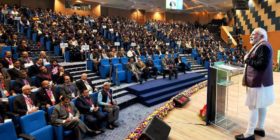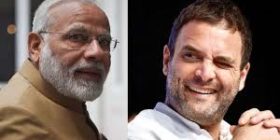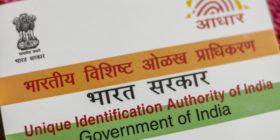Prime Minsiter Narendra Modi has always addressed Indian Diaspora during his foreign tours, appealing and encouraging them to invest in their homeland. Behind the powerful speeches, actions and plans is Vijay Chauthaiwale, who plans how BJP’s foreign policy should be.
Chauthaiwale, 53, was chosen by BJP President Amit Shah and since then, he has driven Modi’s efforts to reach roughly 28 million expatriates and people of Indian origin around the world, helping plan glamorous events at venues such as Wembley Stadium .
To lure foreign investments, Modi has been bettering relations with the NRIs. It also allows Modi to increase the profile of Indians in the U.S, United Arab Emirates and elsewhere, turning these large communities into politically potent constituencies that can push local politicians and businesses to seek closer economic ties with India.
“This government sees diaspora as a part of the development story and we want them to be informal ambassadors for India in their own country, engaging themselves with local politicians and actors,” Chauthaiwale told Bloomberg in an interview.
However, everyone isn’t convinced. Experts say Modi’s compelling picth is yet to see results. “PM Modi’s reform efforts have yet to compel a significant number of non-resident Indians to invest or return,” Sreeram Chaulia, dean of the Jindal School of International Affairs and author of a book on Modi’s foreign policy, told Bloomberg.
“Part of the challenge is that India’s economy remains as unpredictable as ever: On Nov. 8, Modi plunged the country into social and economic uncertainty by suddenly invalidating 86 percent of currency in circulation, leading analysts to downgrade growth forecasts. NRIs still look at India with some skepticism, because ease of doing business in India has not improved that much,” said Chaulia.
The Indian diaspora is a crucial part of India’s economy. In 2015, the World Bank said the diaspora sent back $72.2 billion in remittances, more than India’s bilateral trade with the U.S. and almost as much as the $74.9 billion trade relationship with China.
The diaspora, including groups like the Overseas Friends of BJP, can also help Modi’s attempt to change the Indian economy’s reputation for corruption and red tape, Chauthaiwale said.
“Rebranding was necessary, because when Prime Minister Modi took charge, practically everyone had written off India because of the corruption scandals, nepotism and indecision. People are rediscovering the potential of India, especially the NRI community,” said Chauthaiwale,
In an era characterized by a backlash against immigration — with the election of President-Elect Donald Trump, the Brexit vote and Modi’s clash with British Prime Minister Theresa May over student visas — India’s global workforce is under threat.
Modi is pushing for looser migration rules for India’s mobile professionals and Chauthaiwale said the government has made it easier for non-resident Indians to return to India, invest and do philanthropy in their home villages.
Outreach to diaspora groups is a key plank of Modi’s foreign policy that “helps India get accepted as a rising power,” said Chaulia.
These wealthy communities are also a large source of political donations for the BJP, he added.
“It’s a big fundraising mechanism,” Chaulia said. “They don’t mention it. But it’s there.”
As the BJP prepares for crucial state elections next year, the party won’t end its global outreach, Chauthaiwale said, and will help to coordinate foreign visits for cabinet ministers with newly engaged diaspora groups.
“They have a new sense of identity, and they are now also seeing themselves as a force to be reckoned with,” he said.






Leave a reply